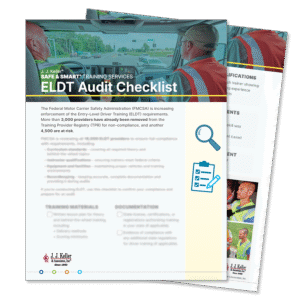When California Gov. Gavin Newsom signed the state’s Assembly Bill 5 (AB5) into law September 18, 2019, the trucking industry was quick to voice its objections to the legislation’s criteria for classifying workers as employees versus independent contractors (ICs).
The conversation quickly moved to the question of what such guidelines might mean if applied on a national level. An industry that depends on IC relationships, with some carriers using ICs for their entire driver base, is certain to be wary when the government attempts to force costly and confusing changes.
That’s why the final rule on the Employee or Independent Contractor Classification Under the Fair Labor Standards Act, issued by the U.S. Department of Labor (DOL) in January 2024, brought a sigh of relief to many. The ruling instituted an “Economic Reality Test” similar to one outlined in a 2021 Trump administration rule rather than following California’s “ABC” test to determine whether a worker should be classified as an employee or an IC.
That relief, however, may be temporary.
Bill Webb, executive director for the Coalition for Independent Truckers, is skeptical.
“To me, it’s just another one of those deaths by 1000 cuts for the independent contractor model,” he said. He believes this year’s November election will be crucial in retaining the current model.
“(The DOL rule) does clearly change from a true AB5 model to something a little muddier, but I truly believe that we’re not going to see much until the presidential election is over,” he continued. “If Biden is reelected, then they will double down and probably begin to aggressively go after carriers based on this new rule.”
According to Webb, the industry is in a “wait-and-see” mode, at least for now.
“That doesn’t impact what’s going on at the state level,” he noted. “AB5 was a direct assault on the independent contractor model. Most state legislatures are doing it indirectly.”
Jon Coca, president of Diamond Transportation, a 100% owner-operator carrier, also sees politics as a factor.
“(Democrats) pick up the pressure and they try to reclassify Independent Contractors and employees, just like every time the red guys get in office,” Coca said. “Just part of the game, I guess.”
When Truckload Authority visited with Coca, he had just returned from a lobbying trip to Washington.
By the end of 2019 — the year California passed AB5— nine other states introduced similar legislation. A December 2023 article published by personnel management firm Wrapbook claims that 36 states are now using AB5’s “ABC Test” (or parts of it) to determine worker classification.
But the issue goes beyond legislatures, Webb says.
“When I ran the Texas Trucking Association, the Attorney General’s Office passed a rule — not even a law — that said if a truck driver is an independent contractor and is in default on a child support agreement, you have to withhold pay from him just like you do an employee,” he shared. “That’s just another line that’s cracking.”
As Webb pointed out, any state or federal agency that has the authority can issue rules blurring the line between employee and IC status.
“Sometimes they realize they’re doing it; sometimes they don’t,” he said.
Whatever direction current classification rules are shifted after this year’s national elections, a carrier’s best protection is in the Independent Contractor Operating Agreement (ICOA).
“As long as companies like us have valid Independent Contractor agreements in place, it’s the best bet to buoy their role in how we work together as business partners,” Coca explained. “I feel safe — but not safe.”
For Coca, part of feeling “safe” is making sure the company’s ICOA is up to date with any new developments.
“We get our Independent Contractor agreement fine-tuned every two years at a minimum, three years at maximum at the Scopelitis (Scopelitis, Garvin, Light, Hanson & Feary) firm,” he explained. “We feel pretty sound that they do a good job making sure that all of the issues are addressed.”
Webb, on the other hand, maintains that the way carriers treat ICs has much to do with how drivers are classified.
“It’s a little bit of a stretch, but I used to ask carriers, ‘Who does your lawn service? Do you make them put your logos on their mowers? Do you tell them what time they have to be there to do the lawn?’” he shared.
Exclusivity is an issue often mentioned in classification cases. In both the ABC test and the Economic Reality test, the nature and degree of control of the IC is listed. If the ICOA specifies the IC is not allowed to haul loads from another carrier or a broker, a ruling might lean towards the status of employee.
“Work that is continuous, does not have a fixed ending date or may be the worker’s only work relationship indicates employee status,” says an Employee Relationship Under the Fair Labor Standards Act fact sheet issue May 20, 2024.
“The problem is, the rules now are being articulated in a way that is almost impossible for a motor carrier to operate and comply with,” Webb said. “You’ve got to do as many of the things right as you can.”
Forced dispatch — or even the appearance of it — can indicate control leading to an employee classification.
“Motor carriers have got to be smarter and get away from forced dispatch,” Webb said. “Many of them will tell you they’re not forced dispatch, but in practice, to some extent they wind up being so.”
Coca says Diamond Transportation has a simple way to avoid this conundrum.
“We just don’t do forced dispatch,” he said. “Our fleet managers are reaching out to just say, ‘Hey, this load game comes up after you’re done. What do you think?’”
ICs make their own decisions about which loads they want to accept, Coca says.
While ICs may not enjoy forced dispatch, they often chose to lease their equipment to a carrier because of the stability that comes from receiving regular loads from one source.
“If you want to choose loads from different sources, just be truly independent and go through a broker,” Coca suggested. Doing so, however, requires the IC to obtain their own authority. “That’s basically what they’re leasing us for.”
Unfortunately, the wishes of the IC is often lost in the classification dispute.
“They lease on to a company because they want that company to be able to provide great for them,” Coca said.
David Heller, senior vice president of safety and government affairs for the Truckload Carriers Association, agrees.
“Independent contractors are independent contractors because they want to be,” he noted. “And they’ve chosen this business model because it’s successful and works for them.”
As the debate continues, the question of how much longer the IC business model will be around remains a prime concern.
“I think we can all agree that this business model is under threat and that we as an industry need to try to preserve it,” Heller said. “There’s no doubt it’s a valuable model.”
Cliff Abbott is an experienced commercial vehicle driver and owner-operator who still holds a CDL in his home state of Alabama. In nearly 40 years in trucking, he’s been an instructor and trainer and has managed safety and recruiting operations for several carriers. Having never lost his love of the road, Cliff has written a book and hundreds of songs and has been writing for The Trucker for more than a decade.















